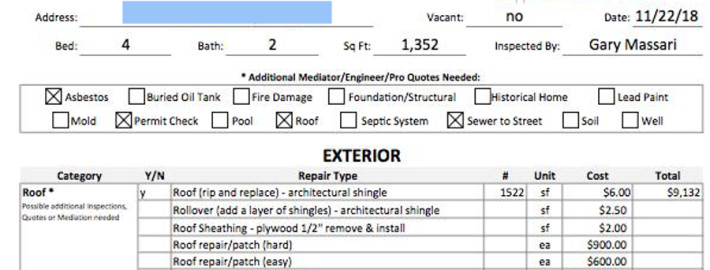How to Determine the Value of Good Probate Real Estate Leads
By Leon McKenzie, CEO, US Probate Leads

The real estate industry is full of potential for both REALTORS® and investors looking to cash in. One sector within the industry that will allow you to spread your wings and fly is the probate real estate sector. This sector has a value that runs in the trillions due to wealth left behind by aging and dying American homeowners. If you are interested in building a profitable realty or real estate investment business, then you definitely should pursue probate leads.
There is one question though: what constitutes a good probate real estate lead? What should you be on the lookout for when determining whether to spend your time and money investing in marketing to that lead?
After all, time is money and you do not want to pursue probate leads that are going nowhere. Not when you have to contend with competition.
Well, the secret is in having a list of criteria that you can use to find the right leads. Here are some of the factors that you can consider:
1 THE REPUTATION OF YOUR PROBATE LEADS SOURCE
Probate leads are only as good as their source. Do you have any idea of the reputation of your source? Now, you could go down to the county courthouse yourself and attempt to find a few leads that you could follow, but be prepared to spend a lot of time there.
You can rest assured however, that this is the most reliable way of getting good leads.
You could also use referrals to find leads but there is only so much you will get in the way of quantity of leads. How many people do you know who can tell you where the latest probate leads are?
You could also utilize online resources like social media, but there would be no way of you ascertaining whether the information you are getting is correct until you follow up. And this could waste a lot of your time.
For all the above reasons, you should consider using a probate leads company whose sole job is to find good probate leads for its clients. A company of this nature would do due diligence because its reputation depends on the quality of the product it provides.
Do note that not all probate real estate leads companies are worth your money. You want to get your information from a company that is reputable and reliable. A company that provides the latest leads is your best shot of getting access to good quality leads that have yet to be pursued. In addition, your leads source should provide a comprehensive list of leads from as many counties as possible from across the nation.
2 THE POTENTIAL VALUE FOR MONEY YOUR PROBATE LEADS CAN BRING
You have no way of knowing which probate leads will work out for your real estate business and which ones will not. However, you can determine based on the pricing package whether leads are worth buying in the first place.
Quantity is not always a good thing. Cheap is not always better. What you want is quality. Ten probate leads that will result in a sale or two are much better than 50 probate leads that will not work out at all.
So, what you are looking for is how many leads are on offer for sale, how much they will cost you, and their potential return on investment. You also need to consider just how many people will have access to the same set of probate leads at the same time you do.
The latter is very important because it determines the level of competition you will have with other REALTORS®and investors for the same leads. This in turn will determine your success rate when it comes to converting those leads into clients.
It would be prudent therefore for you to be on the lookout for a set of probate leads sold for a fixed affordable price. It would be even more profitable for you to hold out for leads that are offered to you exclusively for a set period so that you can have the first shot before your competitors get access to the same leads.
3 THE QUALITY/ COMPREHENSIVE NATURE OF THE LEADS
What is the nature of the leads that you have access to? We definitely are not talking about the name of the executor and nothing else.
A name alone will not help you if you want to launch a marketing campaign strategy to reach out to your potential clients. What you want are details; lots and lots of details. You are far better off getting a probate lead that constitutes of the mailing address of the probate property and the phone number of the person who can be reached as primary contact. This is much better than having a name only. You can always address an introductory letter to the title “the executor” until you are able to get the name of the contact you reach out to.
If a lead does not contain at least the mailing address, ignore it. That lead is not worth your time and energy. It will require you to waste a lot of resources just to find out if the lead is worth pursuing, which you could have spent wooing otherleads and trying to convert them.
4 RESPONSIVENESS OF THE LEAD
A lead remains so until you convert that person into a customer. For that reason, you need to gauge whether a lead is worth pursuing further based on how responsive that party is to your first attempt to communicate.
If you want to be the best REALTOR® or real estate investor in your locale, it is important for you to learn how to read into not only what people are saying, but also what they are not saying. When you choose to stick to probate real estate, be aware that you will be dealing with the grieving on a regular basis, and they are a bit more unpredictable than the ordinary potential seller. So, gauging how responsive they are is a skill that you need to learn, and learn very fast.
The fact of the matter is that most executors who act as the primary caretakers of probate properties are motivated sellers. It’s just that some of them need to grieve and get their act together first before they choose to part with the properties that they are in charge of.
As a REALTOR® or real estate investor, you need to keep two lists. One list should be for those leads that are very responsive, and the other should be for those leads that are worth revisiting several months in the future.
 The moment a lead that you reached out to contacts you, pay very close attention to what that person wants. If the lead in question just wants to ask what it is that you do, that’s good enough. Even if that lead is not ready to be converted into a customer, the fact that he or she has reached out to your business means that what you are offering in the way of services has caught the lead’s attention. You should double down, and nurture that lead until you can get what you want.That is a very good quality lead.
The moment a lead that you reached out to contacts you, pay very close attention to what that person wants. If the lead in question just wants to ask what it is that you do, that’s good enough. Even if that lead is not ready to be converted into a customer, the fact that he or she has reached out to your business means that what you are offering in the way of services has caught the lead’s attention. You should double down, and nurture that lead until you can get what you want.That is a very good quality lead.
Other very good quality leads consist of executors who live far away from the probate property they are in charge of, as well as those in charge of prime properties that beneficiaries are fighting over. Such executors are usually very motivated to sell and get rid of the troubling property just so that they can have peace of mind and steer clear of stress. Also be on the lookout for leads associated with properties that have pending bills. The bills indicate an overwhelmed executor who has no idea of how to go about managing an additional property. Leads of this nature can easily be converted to customers because they do not want to handle financial stress for long.
That said you should not completely ignore leads that show a reluctance to even contemplate selling a prime probate property. If the death of the lead’s loved one is still fresh, it makes sense that the executor will not be in a mood to part with that person’s property. But if you were to offer your services a few months down the line, that lead would be more amenable to being nurtured and converted into a customer.
It would be prudent therefore, for you to learn the useful skill of gauging the responsiveness of a probate lead on a case-by-case basis.
CONCLUSION
While the real estate industry as a whole is very competitive, a significant part of the probate real estate sector is still uncharted. You can be a pioneer in your locale, if only you take the time to invest in your realty or real estate investment business.
The quality of your probate leads is the foundation to building your real estate business into a successful company, so tread carefully when acquiring them. Start by scrutinizing the reputation of your probate
leads source, determining the ROI, selecting the highest quality of leads based on details provided, and then learning how to gauge the responsiveness of the leads you contact. By paying attention to the details, you will set yourself up for success. It will be much easier for you to laugh all the way to the bank thereafter.
FOR MORE INFORMATION
Leon co-founded US Probate Leads more than 12 years ago and has witnessed its growth during that period from a one city lead provider in the probate space to the only national provider of probate leads for virtually every county in the country.
Leon likes to point out that US Probate Leads is the only company providing Probate-related Real Estate-related leads to Investors and REALTORS® based on data collected directly from individual probate courts in virtually every state. This has been achieved by building a National Network of Researchers that visit each county one time each month. Leon’s team processes this incoming data and makes it available to individual subscribers for their use in reaching out to highly motivated property sellers.







 The new rules change how the IRS can audit an LLC or LP. In the past, an IRS audit of an LLC or LP taxed as a partnership involved auditing, settling and collecting tax shortfalls from each individual partner. In a master limited partnership (think oil and gas or real estate) with thousands of partners, this was very difficult.
The new rules change how the IRS can audit an LLC or LP. In the past, an IRS audit of an LLC or LP taxed as a partnership involved auditing, settling and collecting tax shortfalls from each individual partner. In a master limited partnership (think oil and gas or real estate) with thousands of partners, this was very difficult. As a service to our clients, we are charging just $295 for an amended and restated document. We will also include meeting minutes in which all partners approve of the new rules. It is your responsibility to make sure everyone signs the new agreement.
As a service to our clients, we are charging just $295 for an amended and restated document. We will also include meeting minutes in which all partners approve of the new rules. It is your responsibility to make sure everyone signs the new agreement.





 A critical way to control the tenant density environment, improve service to tenants, and reduce costs is to have full time on-site property management and maintenance.
A critical way to control the tenant density environment, improve service to tenants, and reduce costs is to have full time on-site property management and maintenance.



 An advocate for responsible investing Jasmine spends her time educating audiences on conservative real estate strategies. She has owned rentals and flipped out-of-state properties since 2005 in states such as California, Mississippi, Indiana and New Jersey to name a few. She is the Managing Director of The Note Assistance Program a firm that provides additional security and education on real estate investing, specifically with non-performing notes. Her reputation for the judicious use of resources, result-oriented management style and skillfull negotiations, has opened many doors.
An advocate for responsible investing Jasmine spends her time educating audiences on conservative real estate strategies. She has owned rentals and flipped out-of-state properties since 2005 in states such as California, Mississippi, Indiana and New Jersey to name a few. She is the Managing Director of The Note Assistance Program a firm that provides additional security and education on real estate investing, specifically with non-performing notes. Her reputation for the judicious use of resources, result-oriented management style and skillfull negotiations, has opened many doors.

 Tim, who would much rather talk about his great team members and customers, than himself, can’t be ignored. He continues to both harness an elite level of thoroughbred leadership, and be highly relatable to.He’s been the Marine who just got out of the service with no money and no credit. He has been the once successful hard working professional who had to fend off foreclosure in the great recession. Yet, he has also headed up Blackstone’s B2R Finance division. Now he also knows the point when you’ll get the back out on the new Mustang, and when to throttle it to maneuver safely. He’s been where you are, and knows the way forward.
Tim, who would much rather talk about his great team members and customers, than himself, can’t be ignored. He continues to both harness an elite level of thoroughbred leadership, and be highly relatable to.He’s been the Marine who just got out of the service with no money and no credit. He has been the once successful hard working professional who had to fend off foreclosure in the great recession. Yet, he has also headed up Blackstone’s B2R Finance division. Now he also knows the point when you’ll get the back out on the new Mustang, and when to throttle it to maneuver safely. He’s been where you are, and knows the way forward.